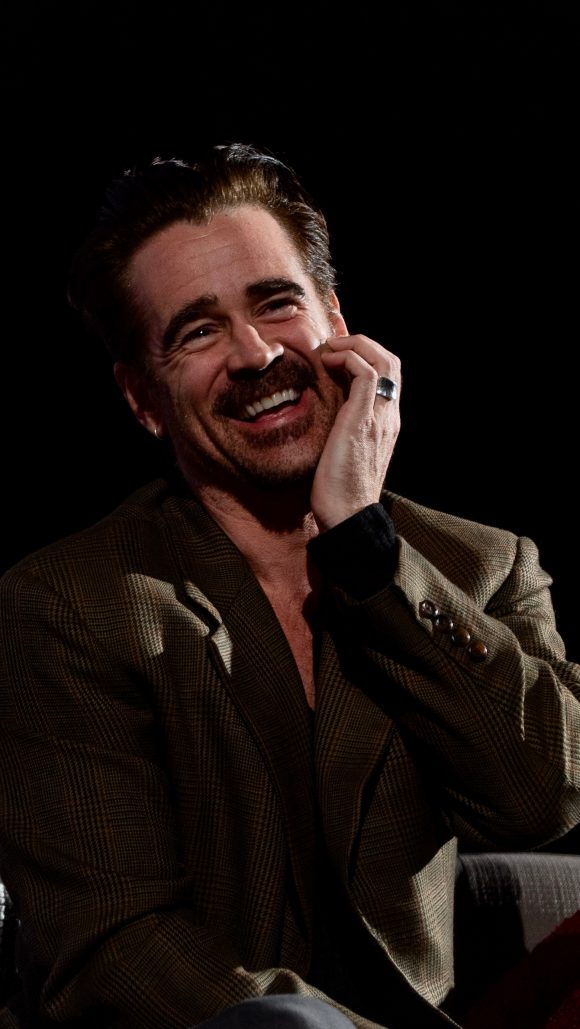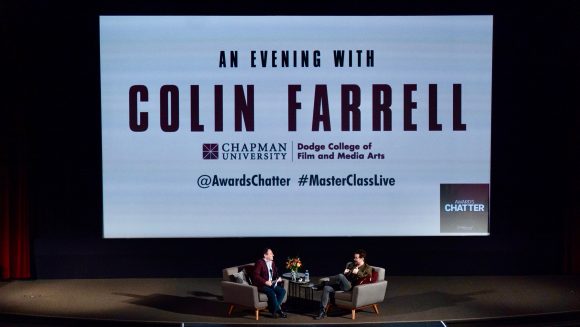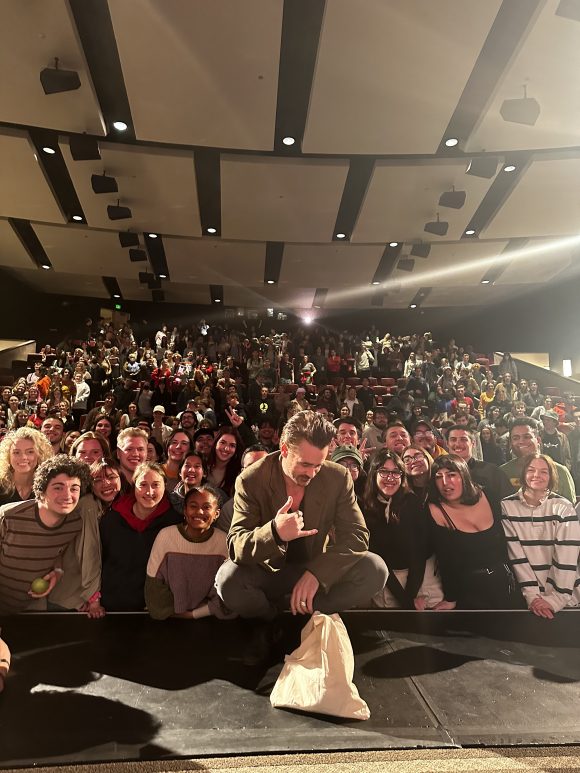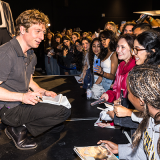
Who Wouldn’t Want to Be Friends with Colin Farrell? Master Class Series - February 2, 2023
February 7, 2023
It is a confusing and painful experience being human. It is in our nature to take care of others, but we also have a duty to take care of ourselves however we see fit. We fight these little wars with the people we love every day of our lives while also being surrounded by wars in the world around us. If you haven’t been keeping up with awards season this year, you may be unaware of the hype surrounding a film that discusses precisely that conflict: The Banshees of Inisherin.
Dodge College had the honor of hosting a Master Class with star of the film and now Oscar-nominated actor Colin Farrell for the Awards Chatter podcast on February 2. 
Colin Farrell has had quite a bumpy career between being born in Castleknock, Ireland to stepping on the Dodge’s MKS stage. He carries the crazy stories of his life with him every day – the good the bad and the ugly – and isn’t afraid to share that with the world. I have never seen a celebrity so willing to open up about the mistakes they’ve made in their career and how they have overcome the hardships to bring themselves to where they are today.
If you would have asked young Farrell what he wanted to be when he grew up, he would have told you being a footballer (soccer for us Americans). He always loved watching movies, but being an actor was never a thought that came to mind. He didn’t have a philosophical understanding of film until he watched Paris, Texas. It was a compelling and powerful experience for him. “The hunger I didn’t have for soccer, I had for acting.”
He wasn’t the most outstanding student in the world, flopping around to three secondary schools. There was a brief period between the ages of 16 and 17 when he was a line dancer. It was all the craze in Ireland then: huge Stetson hats, denim, shirts with no sleeves, and a big headband with a microphone on it so he could speak to the crowds. He and his group traveled around Ireland in a CMT minibus.
He eventually took an acting workshop at the school his brother taught at. That was really the start. Earlier on, the principal at the last secondary school he went to was also the English teacher, and leading up to final exams, she made the students study Othello. She would have them stand up and read out the play in class. But this workshop was the first time he was given the opportunity to talk freely about his feelings. He grew up in a household where emotions were seen as a weakness, and this was a space – no bigger than the stage in the Folino – where he was allowed to speak his mind and put his emotions into his work.
The first commercial he ever acted in was an anti-smoking commercial in Australia, which he calls ironic looking back on it now. During the summer after a year of attending the Gaiety School of Acting in Ireland (thanks to his brother for pushing him to go), he auditioned for the show Ballykissangel, an Irish soap opera of sorts. To his surprise, he got the part! The decision he had to make now was either go back to acting school for the second year or drop out and become a full-time actor on the show. I think we all know what choice he made.
He consistently says joining Balleykissangel was one of the best decisions of his life. Soap operas are the best training ground for young actors. With so much to film, actors plow through huge amounts of text, not to mention getting to work with a variety of spectacular actors.

At the ripe age of 22, after getting an agent at CAA and having a little professional acting experience from Balleykissangel, he landed the lead role of Bozz in Joel Schumacher’s Tigerland. He decided the thing to do before his newfound fame was travel around America and learn about the place and people he would soon immerse himself in for the role. One of the things he did was read Dear Mom: A Sniper’s Diary of Vietnam. At this point in the master class, Colin got a little emotional. He barely knew anything about American history, so to learn all of this at once was very eye-opening for him.
After Tigerland, his life felt like it was shot out of a cannon: Minority Report directed by Steven Spielberg, Phonebooth also directed by Joel Schumacher, The Recruit starring Al Pacino. New York Times constantly talked about his amazing “bushy male eyebrows.” Looking back, he knows all of this was an absolute gift in his life, but for someone so young and with such a sensitive constitution and low confidence, his weaknesses were easy to find and easy to exploit. At the time, he didn’t think he deserved the love he was getting. Now, he thinks differently. “Just be grateful. Don’t feel like you don’t deserve it. Don’t feel like you do deserve it. Just live in it. Just keep moving and working.”
Then Alexander happened. He had the title role, with a 155 million dollar budget, filmed on three continents, with practically no CGI. “We all thought we were heading to the Oscars, talking about what suits we were going to be wearing. As an actor, you never want to disappoint the audience.” He uses the example of parents getting a nanny and going to the movies for a date night, only to come out of the theater and be disappointed by what they watched. He would never change his experience with that film for the world, but the reviews from critics and audiences were almost all negative. They called him “Alexander the ___” and filled in the blank with every word other than great.
 Between then and now, his career has made an even more significant jump than immediately following Tigerland. There were cheers from the students in the audience when In Bruges, The Killing of the Sacred Deer, The Lobster, After Yang, and Thirteen Lives were mentioned, just to name a few of his critically acclaimed films. And, of course, The Batman has made some appearances in this year’s award season with a spinoff show, The Penguin, based on Farrell’s character in the works.
Between then and now, his career has made an even more significant jump than immediately following Tigerland. There were cheers from the students in the audience when In Bruges, The Killing of the Sacred Deer, The Lobster, After Yang, and Thirteen Lives were mentioned, just to name a few of his critically acclaimed films. And, of course, The Batman has made some appearances in this year’s award season with a spinoff show, The Penguin, based on Farrell’s character in the works.
Originally when Martin McDonagh sent him the script for Banshees, it had a different title and an entirely different ending. The original ending was much more violent, and there was an additional character from the war on the mainland. Farrell absolutely loved the script and the character of Pådraic, but he begged McDonagh to give the role to someone else. “I come with a lot of baggage.” Thankfully, McDonagh said to him something along the lines of “Shut the fuck up, you aren’t the casting director.” Then, McDonagh reworked the entire thing even though it was practically perfect, and Pådraic became more of an emotional sweetheart of an Irish man. “My character was cooler in the first one.” However, Farrell notes that now as a seasoned actor, he wants to do different films and characters every time. The Penguin is very different from Pådraic, and Pådraic is very different from Ray in In Bruges.
Colin Farrell is thankful for all the people that have helped him along the way. Friends, family, people in the industry, and fans like us who continue to support his work. He still gets nervous going to work on a new job, not as nervous as he was at the beginning of his career though. I am glad he found his way to acting and stuck with it. He was meant to live out his life on the big screen.
If the universe had given me the 1% chance of being best friends with Colin Farrell, or Pådraic Súilleabháin for that matter, I would never let them go.

